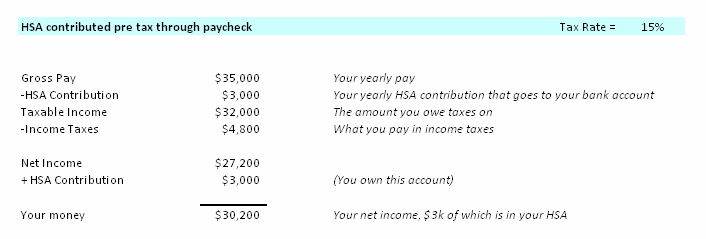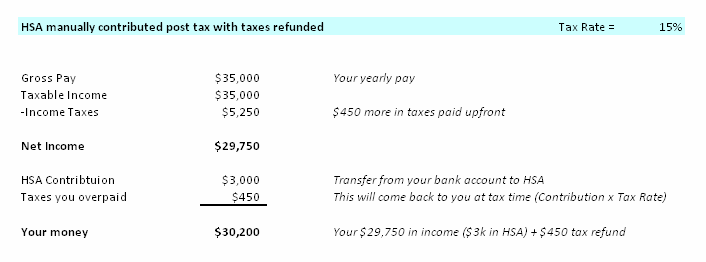What if you lost your job tomorrow? Just the thought of unemployment makes most people cringe. Besides wrecking havoc on your finances, unemployment causes emotional stress and discomfort. For the vast majority, their employer is their single biggest source of income.
Dealing with a job loss is easier if you have prepared. As you will see, there are ways an HSA can help you during an unemployment spell. Hopefully you are in the planning stages now and can take action. If you are eligible but haven’t opened an HSA yet, it might be a good time to take 5 minutes to do so.
HSA contributions can benefit you in the following ways during unemployment:
Pay for Health Insurance Premiums
If you are receiving state or federal unemployment aid, you can use your HSA to pay for your health care premiums. Yes, you read that correctly: while unemployed your health insurance premium is considered a qualified medical expense. As you probably know, this is not the case when you are employed.
A good strategy is to build your HSA so that the account could cover 6 months of health insurance after a job loss. There are a number of benefits to this. For one, you continue coverage that limits your total financial liability– an important part of protecting your assets. Moreover, you will not need to write a check for health insurance each month; you simply use your HSA funds. This definitely helps with cash flow as money will be tight.
Thirdly, it is great piece of mind to know that no matter what happens, you can cover X months worth of health care premiums with your HSA. You have a plan and have cash reserves to get through the worst of it. Once your situation brightens, you can rebuild your HSA fund.
Tax Free Cash Withdrawal
Your HSA can also function as a backup emergency fund, allowing you to withdraw tax-free cash in times of need. You can only do this by reimbursing yourself for previous Qualified Medical Expense (QME) paid out of pocket. I call this strategy using your HSA as an ATM. The way it works is this: if you incur a QME and elect to pay it out of pocket (i.e. not with your HSA), you can reimburse yourself for it from your HSA at any time in the future. This simply involves transferring money from your HSA to your checking account in the amount of the initial QME. For example, if you incur a $50 expense for a doctor visit, and you pay for it in cash, you are allowed to transfer $50 from your HSA to your checking account in the future. This functionally makes the purchase tax-free, and these credits can be carried forward indefinitely.
Why would one want to carry forward Unreimbursed QME? For one, you are allowing your HSA to compound and grow. Due to the contribution limitations, each dollar in your HSA is somewhat valuable. Paying medical expenses out of pocket protects your HSA, allowing it to grow from the highest possible base.
Additionally, carrying forward Unreimbursed QME allows you access to cash when needed. If an emergency occurs, you can cash in your Unreimbursed QME credits for cash. This is not the most ideal investment strategy, as you are reducing your principal, but sometimes emergencies require this action. This is an advantage over accounts such as 401(k) that have a penalty for most cash withdrawals,
Cash Withdrawal w/ tax and penalty
This option is the most painful of the three, but it is still an option. Perhaps you do not have any UQME with which to reimburse yourself. At any time, you may make a non-qualified withdrawal from your HSA to pay for anything you want. Basically, being non-qualified means the expense is not a qualified medical expense. You simply ‘undo’ or take back your HSA contribution.
However, this comes at a (steep) price. A non-qualified withdrawal invokes the following:
- Tax Man – This amount withdrawn is added to your current year’s gross income, which means it will be taxed. Initially, you contributed tax free, but since you will be using this money for non qualified purchases, you must now pay tax on this. For example, if your tax rate is 20% and you withdraw $500, you owe $100 in taxes.
- Penalty – Secondly, there is a 20% penalty for non-qualified withdrawals. This amount is due to the IRS come tax time, and it is not fun. Back to the prior example, besides the $100 in taxes, there is also a $100 penalty due. Note: if you are over 65, this penalty does not apply to you. That is why an HSA is a great long term savings vehicle for the young, as you only owe income taxes on non-qualified withdrawals in your golden years.
The math shows why this option is so poor. In our example, a $500 non-qualified withdrawal results in only $300 in your pocket. You give away a huge percentage of your hard earned money to the government in this maneuver. But sometimes you have no other option.
If you are at risk of having to make a non-qualified withdrawal during normal (employed) times, perhaps you are being too aggressive with your contributions. One suggestion would be to park your HSA contributions in your emergency fund before contributing to your HSA. Here, your money is much more liquid and you avoid penalty for withdrawing it. At the end of the tax year, once any possible emergencies or costs have arisen, you can make a lump sum transfer to your HSA for that year’s contribution. Contributing late in the year is far better than a 40% hit.
Conclusion
Having both a strong HSA balance and unreimbursed QME credits puts you in an advantaged financial position. During a spell of unemployment, these provide cover for 1) insurance premiums and 2) random cash needs. I make it one of my goals to pay all of my QME out of pocket so I can pull tax-free cash later. This is an excellent safety net for an unexpected job loss.
In the worst case, you are prepared for difficult times. In the best case, you have more in your HSA to compound and grow. Get strategic with your HSA to better prepare for your future.


